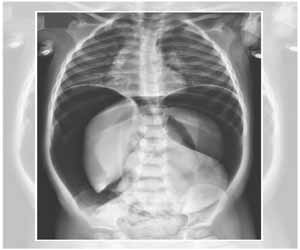- Home
- Editorial
- News
- Practice Guidelines
- Anesthesiology Guidelines
- Cancer Guidelines
- Cardiac Sciences Guidelines
- Critical Care Guidelines
- Dentistry Guidelines
- Dermatology Guidelines
- Diabetes and Endo Guidelines
- Diagnostics Guidelines
- ENT Guidelines
- Featured Practice Guidelines
- Gastroenterology Guidelines
- Geriatrics Guidelines
- Medicine Guidelines
- Nephrology Guidelines
- Neurosciences Guidelines
- Obs and Gynae Guidelines
- Ophthalmology Guidelines
- Orthopaedics Guidelines
- Paediatrics Guidelines
- Psychiatry Guidelines
- Pulmonology Guidelines
- Radiology Guidelines
- Surgery Guidelines
- Urology Guidelines
Pneumoperitoneum from a Gastric Perforation in young child: Case study

Dr Alexandra Masson, at Hôpital de la Mère et de l’Enfant, Limoges, Limoges, France and colleagues have reported a rare case of pneumoperitoneum from a Gastric Perforation. The case has appeared in the New England Journal of Medicine.
A two-and-a-half-year-old boy was brought to the emergency department after he had a seizure during a febrile upper respiratory illness. An adult who witnessed the seizure was concerned that the boy had stopped breathing and initiated chest compressions and rescue breathing. The boy regained consciousness after approximately 1 minute.
On physical examination, he was awake and interactive, and a neurologic examination showed no deficits. He appeared uncomfortable, and his abdomen was distended, tympanitic, and tender. Radiography of the abdomen showed pneumoperitoneum. No rib fractures were noted. Exploratory laparoscopy revealed a perforation on the posterior wall of the stomach, without intraperitoneal fluid or other small or large bowel abnormalities.
The gastric rupture was thought to have been caused by barotrauma from acute gastric distention during the resuscitation attempt. The perforation was repaired surgically. The patient remained in the hospital for 3 days, and no additional gastrointestinal issues or seizures were observed. He recovered uneventfully from surgery and the upper respiratory illness. At a follow-up visit 6 months later, he was growing and developing well.
In cases of gastric rupture following points should be considered:
- In younger Patients and children gastric rupture may be caused by barotrauma from acute gastric distention during the resuscitation attempt.
In the older patients, peptic perforation is not unusual as a complication of peptic ulcer disease and can have an atypical presentation.
A high level of vigilance and early attention to an ‘acute abdomen in older patients’ are advocated to avoid delay in diagnosis and life-saving intervention.
Non-steroidal anti-inflammatory medications must be used with extreme caution in the older age group.
For more details click on the link: DOI: 10.1056/NEJMicm1814352

Disclaimer: This site is primarily intended for healthcare professionals. Any content/information on this website does not replace the advice of medical and/or health professionals and should not be construed as medical/diagnostic advice/endorsement or prescription. Use of this site is subject to our terms of use, privacy policy, advertisement policy. © 2020 Minerva Medical Treatment Pvt Ltd